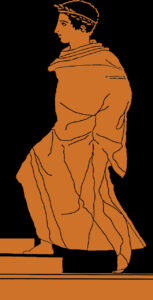Nagy, Gregory. 2022. “Revisiting Plato’s Rhapsody: A contribution to a colloquium about Poetic (Mis)quotations in Plato.” In “Poetic (Mis)quotations in Plato,” ed. Gwenda-lin Grewal. Special issue, Classics@ 22. http://nrs.harvard.edu/URN-3:HLNC.ESSAY:102302569.

p. 3: There is a pervasive historical connection, I argue in this book, between two evolving institutions—Homeric poetry and the festival of the Panathenaia in the city of Athens. The testimony of Plato will be crucial to the argumentation.
p. 7: For the moment, we are looking at a possible point of contact between two of the three central subjects of this book, Homer and the festival of the Panathenaia in Athens. I seize this moment to connect the third central subject as well: Plato. Why Plato? It is because he is our primary source of information about points of contact between Homer and the Panathenaia. Without Plato, the available evidence—literary, epigraphical, iconographical—is so meager that we might easily give up hope for reconstructing anything of significance. Even with Plato’s help, the evidence is relatively meager. Still, we find in Plato references to Homer and the Panathenaia that are of great importance.
p. 8: I intend to examine systematically the overall testimony of Plato as an expert—albeit a hostile one—about the cultural legacy of Homeric performances at the Panathenaia.
pp. 9–10: By studying both direct and indirect references to the Panathenaia in the works of Plato, supplemented by occasional references in various other literary sources and in the attested epigraphical and iconographical evidence, we find opportunities for reconstructing what might be described as synchronic cross-sections or even “snapshots” of seasonally recurring occasions for the performing of Homeric poetry at the festival of the Panathenaia at Athens, dating back to at least as early as the sixth century BCE. A most useful starting-point is the Hipparkhos of “pseudo-Plato” [228b–c]:
p. 12 (epitomized): According to the story in “Plato” Hipparkhos, as just quoted, we see that there existed in Athens a custom of maintaining a fixed narrative sequence for publicly performing Homeric poetry at the Panathenaia, with each performing rhapsode taking up the narration where the previous rhapsode left off. Classicists conventionally refer to this custom as the “Panathenaic Rule.” The author of the Hipparkhos says that this custom was initiated by Hipparkhos, son of Peisistratos, in the era of the tyrants.
p. 15 (epitomized): The author of the Hipparkhos takes it as a given that the Homeric Iliad and Odyssey are a unity, an integral whole, and that this unity is connected with rhapsodic sequencing, an institution still current, we are told, in the era of this author. As we have seen, the actual idea of sequencing is marked by the adverb ephexēs ‘in sequence’, as in the passage I have quoted, Hipparkhos 228b–c. According to the logic of this and other such passages that I have collected in Plato’s Rhapsody, the unity of Homeric composition is a result of rhapsodic sequencing in performance.
p. 16 (epitomized): The principle of rhapsodic sequencing is linked to another principle, relay mnemonics. The process of maintaining an overall continuum of Homeric narrative requires of Homeric rhapsodes a sustained mindfulness about their sequencing of the narrative. Thus the rhapsodes who perform Homeric poetry at the festival of the Panathenaia must to some extent collaborate with each other. But they also compete with each other.
p. 22 (epitomized): The principle of competition in the performance of Homeric poetry by rhapsodes at the festival of the Panathenaia in Athens is evident in Plato’s Ion. This dialogue is named after a rhapsode named Ion, who hails from Ephesus and who comes to Athens to compete for first prize at the Panathenaia (καὶ τὰ Παναθήναια νικήσομεν, Ion 530b2). Plato’s wording makes it explicit that the occasion for the performing of Homer by rhapsodes at the Panathenaia is in effect a competition or contest among rhapsodes, an agōn (ἀγῶνα at Ion 530a5, picked up by ἠγωνίζου and ἠγωνίσω at a8), and that the agonistic art of the rhapsōidoi ‘rhapsodes’ falls under the general category of mousikē (μουσικῆς at a7). Similarly in Isocrates Panegyricus 159 the wording specifies that Homeric performances were taking place ‘in contests of mousikē’, ἐν τοῖς τῆς μουσικῆς ἄθλοις.
pp. 22–23: The rhapsode Ion performs Homer not only on such major occasions as the competitions taking place at the festival of the Panathenaia. He also performs Homer on less formal occasions such as the convivial but competitive encounter dramatized in Plato’s dialogue Ion, where we see the rhapsode being challenged by Socrates to perform a given selection from the Homeric Iliad and Odyssey. The term “selection” is misleading, however. It implies a purely textual mentality—as if all that Ion had to do was to “quote” some passage that he had read and happened to have memorized. Even the word “quote” can mislead, since it could imply the saying of words that have already been written. In my own analysis, I continue to use “quote” only in a restricted sense, to mean the saying of words that have already been spoken. To signal this semantic restriction, I will continue to use the word “quote” only in quotes, in order to stress that I mean no implications of textuality. In the art of the rhapsode, to “quote” is not to “take” something out of a text, out of context. The rhapsodic “taking” of words requires the mnemonics of continuity. What the rhapsode can do is to start anywhere in the Iliad and Odyssey and, once started, to keep going.
Not to be outdone in anything by Ion, Socrates then proceeds to show off his own rhapsodic skills. He argues against Ion’s arguments by likewise “quoting” Homer and then by engaging in a verbal commentary on his “quotations.” In order to “quote” Homer, Socrates performs Homer rhapsodically in his own right, since he too joins Homer midstream—but he does it at three different points of the narrative. In rapid succession, Socrates “quotes” a series of Homeric “passages” in order to out-argue Ion—and even to out-perform him rhapsodically (538d1–3, 539a1–b1, 539b4–d1).
